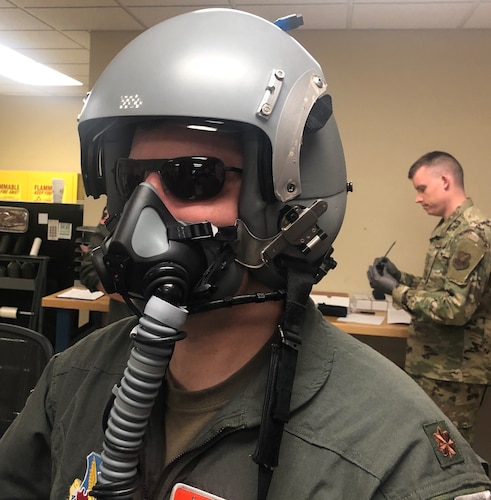The Air Force Life Cycle Management Center's Human Systems Division is in the process of upgrading protective eyewear for aircrew operating various U.S. Air Force aircraft around the world.
Comprised of eight different devices and known as the Block 3 family of products, the eyewear will provide protection from laser threats and introduces a combined laser and ballistic protection capability for the first time.
"The health of the eye is so important to our pilots," said Capt. Pete Coats, lead program manager for the Human System's Division's Aircrew Laser Eye Protection Program. "The consequences of getting lasered without having proper protection could not only prevent the pilot from flying and landing an aircraft safely, but it could also cost them their career. So, our goal is to ensure the right eyewear is available to everyone."
Eyewear devices include separate day and night spectacles, ballistics spectacles, and visors designed to integrate with night vision goggles. The devices will be available for all aircrew except for those operating U-2 and F-35 Lightning II aircraft.
The type of eyewear protection aircrew will receive will depend on the mission.
"If flying low and slow or hovering like a helicopter or CV-22 Osprey, aircrew would prefer to have ballistic protection as well as laser protection," said Mark Beer, Aircrew Laser Eye Protection Program deputy program manager. "However, if you're in a fighter aircraft or flying in a bomber at high altitude, the chances of you needing ballistic protection are not nearly as high."
Along with improved protection, the night eyewear will allow more natural light through the lens increasing visibility for crew members.
A key part of developing the eyewear has been partnerships with stakeholders.
"We've worked very closely with the Air Force Research Laboratory on this effort," Coats said. "They [AFRL] were instrumental in the pre-engineering manufacturing and development phase and experiments with dye and filter technologies."
"We also worked with the U.S. intelligence community which provided an assessment of the threats facing aircrew members," Beer said. "We used that information to determine what we needed to protect against and which eyewear protection technologies we needed to pursue."
More than 42,000 devices will be fielded to Air Force units by 2027.







